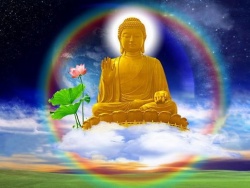Difference between revisions of "Buddhadharma"
| Line 4: | Line 4: | ||
{{Seealso|Dharma}} | {{Seealso|Dharma}} | ||
| − | [[Buddhadharma]] (''[[sangs rgyas kyi bstan pa, bstan pa, chos]]''). [[Buddhism]], the [[teachings of the Buddha]]. | + | [[Buddhadharma]] (''[[sangs rgyas kyi bstan pa]], [[bstan pa]], [[chos]]''). [[Buddhism]], the [[teachings of the Buddha]]. |
[[Buddhism]], or [[Buddhadharma]], is [[Buddha’s teachings]] and the inner [[experiences]] or realizations of these teachings. [[Buddha]] gave [[eighty-four thousand teachings]]. | [[Buddhism]], or [[Buddhadharma]], is [[Buddha’s teachings]] and the inner [[experiences]] or realizations of these teachings. [[Buddha]] gave [[eighty-four thousand teachings]]. | ||
| Line 25: | Line 25: | ||
The [[true Buddha-dharma]] is very [[precious]], but very hard to find. | The [[true Buddha-dharma]] is very [[precious]], but very hard to find. | ||
| − | It is not just {{Wiki|theoretical}} studies, but the methods to enable you to be free from the cycle of [[life]] and [[death]]. It is a system or methods that you follow to understand, realize, and see your [[Buddha]] or original [[nature]]. | + | It is not just {{Wiki|theoretical}} studies, but the methods to enable you to be free from the cycle of [[life]] and [[death]]. |
| + | |||
| + | It is a system or methods that you follow to understand, realize, and see your [[Buddha]] or original [[nature]]. | ||
It is the {{Wiki|fruits}} of practicing or applying the theories and {{Wiki|principles}} of [[Buddhism]] as expressed in the [[Five Vidyas]], [[including]] the various [[supernormal powers]] of the inner [[realization]] [[vidya]]. | It is the {{Wiki|fruits}} of practicing or applying the theories and {{Wiki|principles}} of [[Buddhism]] as expressed in the [[Five Vidyas]], [[including]] the various [[supernormal powers]] of the inner [[realization]] [[vidya]]. | ||
Revision as of 04:39, 11 March 2016
- See also :
- See also :
Buddhadharma (sangs rgyas kyi bstan pa, bstan pa, chos). Buddhism, the teachings of the Buddha.
Buddhism, or Buddhadharma, is Buddha’s teachings and the inner experiences or realizations of these teachings. Buddha gave eighty-four thousand teachings.
All these teachings and the inner realizations of them constitute Buddhadharma.
Buddhadharma does not stay in one place but moves from one country to another.
Just as gold is precious and rare, so Buddhadharma is precious and very hard to find.
Buddha taught how to examine our mind and see which states produce misery and confusion and which states produce health and happiness.
He taught how to overcome the compulsively non-virtuous minds that confine us to states of discontent and misery, and how to cultivate the virtuous minds that liberate us from pain and lead us to the bliss of full enlightenment.
By learning Buddhadharma, we will have the opportunity to gain the happiness we seek and to fulfill all our temporary and [[Wikipedia:Absolute (philosophy)|ultimate]] wishes.
Buddha-dharma (Fo fa): Doctrines or teachings of the Buddha as well as the actual realization and powers derived from the practice of these teachings.
The true Buddha-dharma is very precious, but very hard to find.
It is not just theoretical studies, but the methods to enable you to be free from the cycle of life and death.
It is a system or methods that you follow to understand, realize, and see your Buddha or original nature.
It is the fruits of practicing or applying the theories and principles of Buddhism as expressed in the Five Vidyas, including the various supernormal powers of the inner realization vidya.
It can also be thought of as the essence of or ultimate truth of the entire universe—all that is permanent, not coming, not going, not increasing, not decreasing, not born, not dying.
See; Buddha-Dharma and
See; “Popular Buddhism.”
